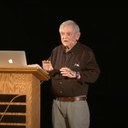Honorary Lifetime Members
HOW TO NOMINATE SOMEONE FOR LIFETIME MEMBERSHIP
Recipients
 Joel Chadabe (1938-2021), NYU Steinhardt, USA
Joel Chadabe (1938-2021), NYU Steinhardt, USA
Lifetime member as of 2019.
Joel Chadabe's Distinguished Lecture video from 2019
Biography: An American composer and author. He is internationally recognized as a pioneer in the development of interactive music.
Joel graduated from the University of North Carolina at Chapel Hill in 1959 with a degree in music, despite his parents' desire for him to become a lawyer. Chadabe then continued his education at Yale University under Elliott Carter, graduating in 1962 with a master's degree in music.
Upon completing his education at Yale, Chadabe and Carter traveled to Rome, where they continued their professional relationship. Chadabe was interested in studying jazz and opera, but ultimately accepted an offer from the State University of New York at Albany to direct its electronic music studio in 1965. He and Robert Moog designed the CEMS (Coordinated Electronic Music System), a Moog modular "super synthesizer" housed at the electronic music studios at Albany which incorporated an early digital sequencer, and he later acquired a Synclavier digital synthesizer for the university.
He was the president of Intelligent Music from 1983 to 1994, and founded the Electronic Music Foundation in 1994. Chadabe was the curator at New York sound gallery Engine 27 in 2000–01. He was given a SEAMUS Lifetime Achievement Award in 2007.
After retiring from his position at Albany in the late 1990s, Chadabe continued teaching as an adjunct at the Manhattan School of Music, New York University, and Bennington College.
His students include Liz Phillips, Richard Lainhart, and David A. Jaffe.
"Joel Cahadabe," n.d., in Wikipedia, https://en.wikipedia.org/wiki/Joel_Chadabe
 Albert Bregman (1936-2023), Department of Psychology, McGill University
Albert Bregman (1936-2023), Department of Psychology, McGill University
Lifetime member as of 2008.
Albert Bregman was invited to give the Keynote lecture at the 2008 CIRMMT General Assembly. His lecture, and sound files, can be downloaded.
Biography: A Canadian academic and researcher in experimental psychology, cognitive science, and Gestalt psychology, primarily in the perceptual organization of sound.
Bregman received a Bachelor of Arts degree from University College of the University of Toronto, with a concentration in Philosophy (ethics), in 1957. He received a master's degree in Psychology, also from the University of Toronto, in 1959. In 1963, he received a PhD degree from Yale University.
Bregman was known for having defined and conceptually organized the field of auditory scene analysis (ASA) in his 1990 book, Auditory Scene Analysis: the perceptual Organization of Sound (MIT Press). His ideas about ASA have provided a new framework for research in the auditory systems of both humans and non-human animals, for behavioural and neurological studies of speech perception, for music theory, hearing aids, audio technology, and the separation of speech from other sounds by computers (CASA). In acknowledgement of these contributions, he was called "the father of auditory scene analysis".
Until his death, Bregman held a post-retirement appointment at the rank of emeritus professor in the Department of Psychology at McGill University. Arriving at McGill in 1965, he became the first professor there to teach cognitive psychology. He also taught courses on Computer and Man, Research methods in experimental psychology, Learning Theory, Auditory Perception, Psychological Theory, and honors research seminars.
Many of Bregman's McGill undergraduate students have gone on to make significant contributions to intellectual life.
"Albert Bregman," n.d., in Wikipedia, https://en.wikipedia.org/wiki/Albert_Bregman
